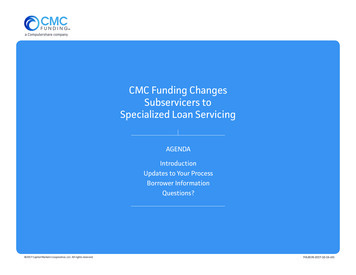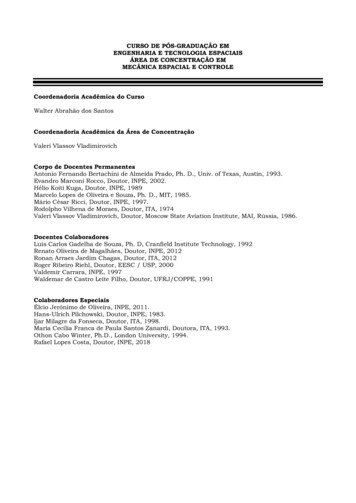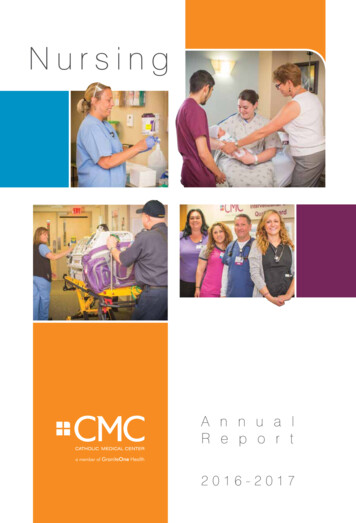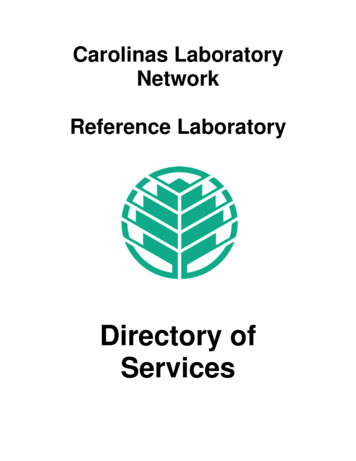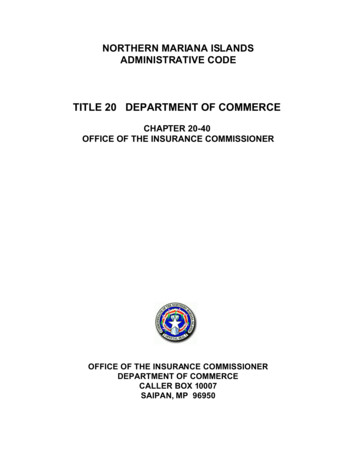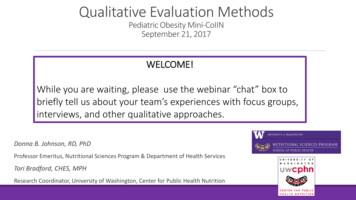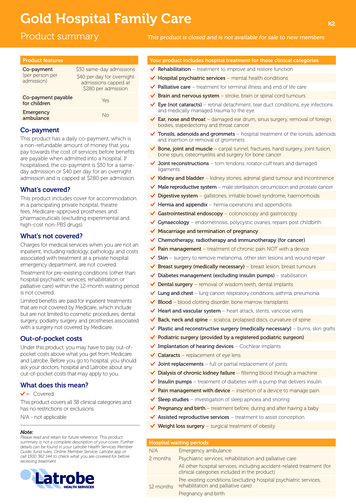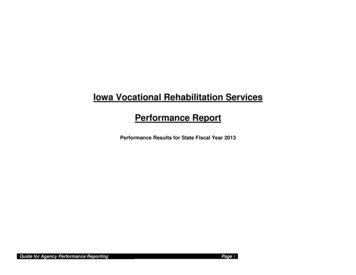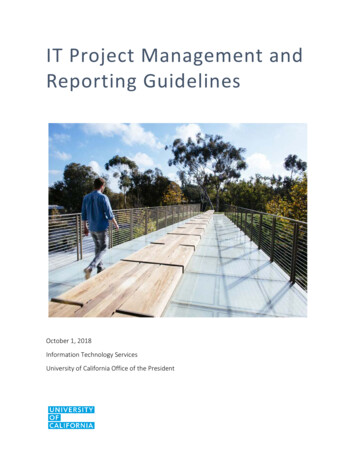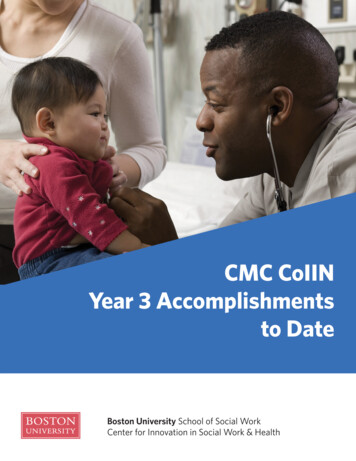
Transcription
CMC CoIINYear 3 Accomplishmentsto Date
The federal Maternal and Child Health Bureau has funded this Collaborative Improvement and Innovation Network(CoIIN) to test and spread promising care delivery strategies and innovative payment models for children with medicalcomplexity (CMC). The goals of the CMC CoIIN are to improve the quality of life for CMC, the wellbeing of their families, and the cost-effectiveness of their care through development and implementation of innovative care and paymentmodels. The CMC CoIIN is in Year 3 (through July 2020) of 4 total years (project ending in July 2021).Who We Are205 individuals involved in the CMC CoIIN153 team members across 10 state teams23 National Advisory Committee members15 individuals across 5 partner organizations6 MCHB partners (leadership and project officer)8 Boston University evaluation team membersKey stakeholder groups on each state team, including: Title V MCH/CSHCN staffFamily leadersFamily-led organization representative(s)Youth and young adults with medical complexityPrimary care medical home representative(s)Children’s hospital representative(s)Medicaid and CHIP liaison(s)Private insurance and managed care liaison(s)State departments of health or human services representative(s)CMC practice site representative(s)What We DoState team project focus areas Care coordinationSupporting rural care via telemedicine and virtual care teamsTransitions from youth to adult care, and from hospital to homeFamily/patient engagement Family leaders as required members of QI team Shared decision-making at the clinical level through shared plan of care (SPoC)Innovative partnershipsTesting of innovative payment modelsTarget populationsThe state team projects focus on children with significant, chronic health problems that affect multiple organ systems,resulting in functional limitations, high health care need or utilization, and often the need for or use of medicaltechnology. Other characteristics include specific durable medical equipment needs, age, transition to adult health careservices, children living in rural areas, and candidates for specific types of procedures and diagnoses. 1,674 CMC havebeen enrolled in interventions across the 10 state teams.
How We Do ItFamily Engagement Family partnership is at the center of the CMC CoIIN33 family representatives across 10 state teams4 family leaders on the National Advisory CommitteeFamily Voices National is a key collaborative partnerFamily representation on the measurement development work groupFamily Engagement spotlight in each newsletter to highlight activities and best practicesFamily Experience Survey Finalized Utilized for outcome data collection by all state teams 581 families surveyed across 10 state teamsFamily Focus Groups 37 Family Focus Group Work Group members, with at least 2 family leaders from each of the 10 stateteams, developed family-led qualitative focus group questions 73 families participated in first roundFamily Engagement in Systems Assessment Tool (FESAT) baseline completedTechnical Assistance to State Teams Coaching Calls: 190 hours total across 10 state teams (130 hours this year)Webinars: 17 state team learning webinars to date (5 this year)Learning Sessions: 2 in-person learning sessions to dateConsultation Visits: 10 on-site consultation visits, 1 for each state teamExpert Consultation: 36 one-on-one expert consultations to date (16 this year)QI Tools: 9 QI tools shared to date with state teams by collaborative partner Population HealthImprovement PartnersOffice Hours: 16 monthly open office hours held (10 months this year)Resource Library: Online literature and resource library for state teams with 370 academic papers,policy briefs, and other resources to date (305 added this year)Team Innovations & Cross-sharing 9 instances to date of connecting state teams through shared areas of interest (4 this year)150 shared project-related files by state teams for state teamsPeer cross-sharing during learning webinars and in-person meetingsGoogle Groups on care coordination, shared plan of care, and family engagementRole-based affinity groups for state team leadership, Title V staff, and carecoordinatorsTopic-specific calls, like EPIC user groupGuidance and Consultation from the National AdvisoryCommittee (NAC) Nationally recognized and experienced family leaders,clinicians, researchers, and other stakeholders7 quarterly NAC meetings to date (3 virtual meetings and 1in-person meeting per year)NAC one-on-one consultations at state team on-siteconsultation visits and during NAC quarterly meetings
State Team AccomplishmentsAll state teams finalized and started their first QI project and began—and some even finished—enrolling their cohortreceiving the intervention.Alabama Team Alabama, in conjunction with families and staff at the University of South Alabama Pediatric ComplexCare Clinic (USC PCCC) and Children’s Rehabilitation Service, developed a SPoC, which has received positive feedbackfrom families. Through the CoIIN project, a CRS Care Coordinator has been providing care coordination services at theUSC PCCC, which have had a positive impact in the quality of life for CMC and their families.Colorado Team Colorado continues to rely upon the Coordination Plus Advisory Team and recently finalized their family engagement strategy to create a vision statement for family participation within the Special Care Clinic. They havehad multiple successes in adapting the electronic medical record to facilitate co-management, including the co-managed identifier, piloting the role clarification table, standardizing communication to community partners, and clarifyingfollow-up appointment timeline with families.Indiana Team Indiana built a state pediatric complex care coordination resource team at the school of medicine, built acare coordination team in two primary care practices—urban and rural—and enrolled 135 patients.Kentucky Team Kentucky examined how to improve family engagement and family satisfaction based on survey data.Additionally, they finalized and distributed marketing material, including family and provider brochures and letters inSpanish and English. They also received additional referrals for virtual care team conferences (VCTC), which include anurse, the VCTC coordinator, parent, and the family engagement leader.Massachusetts Team Massachusetts has worked closely with their family advisory board and consultants to developand implement the ENGAGE program for families of children with complex medical needs undergoing hip surgeries. Sofar, six patients have been enrolled in ENGAGE and are at various stages of the program. The major interventions arecase coordination, the Get To Know Me form, and the SPoC.Minnesota Team Minnesota conducted a full-day Care Coordination Seminar in June 2019, with three national speakers and 150 primary care, specialty care, public health and school clinicians and parents. They also garnered cohesion/gelling of their QI team, emphasized recognition of parent advisor expertise, and initiated several PDSA cycles focusedon building infrastructure to support a rapidly growing complex care clinic.Oregon Team Oregon created the youth-to-adult care transition workbook with their multidisciplinary implementationteam of clinical partners, Title V, and family representatives. Additionally, they successfully collected baseline clinicalstaff survey data and shared the aggregated results with clinical partners and implementation team members, andused the data to inform revisions to their QI project.Texas Team Texas developed and tested an electronic SPoC (with currently over 100 patients and 35 parents usingthe mobile version). They also signed a per member per month (PMPM) agreement with a managed care organization(MCO) for delegation of service coordination. They implemented the first phase of integrated service delivery with foursub-specialty service lines.Washington Team Washington successfully implemented their Birth to One program, assuring activation of all medicaland service referrals for newly-discharged CMC infants. At their one-year milestone, they graduated 7 of 85 currentlyenrolled families who are now able to navigate the health care system with minimal support, who are connected to amedical home, a nutrition home, and early intervention services. They have also engaged collaborators across agencysilos to identify barriers and address system improvements in assuring activation of ESIT (early intervention) referralsand nutrition continuity.Wisconsin Team Wisconsin tested, implemented, and improved new workflows to improve the percentage of ComplexCare Program patients receiving services through Wisconsin’s Children’s Long-Term Support waiver. They developedtools including “goal cards” to facilitate discussions with families about their goals for their child to address this part ofthe SPoC.
Products/Outputs Maintained a public-facing website for project and technical assistance materials Number of pageviews: 2,186 Number of unique visitors: 1,6228 presentations to date by Boston University, partners, and state teams 6 by BU and partners 2 by state teams Upcoming: 1 presentation at the Association of Maternal and Child Health Programs’ 2020 annualconference (Fall 2020) by BU and state teamsMeasurement Activities Implemented Network-level Quality Improvement Measures Surveys with families across 10 stateteams and completed baseline data collection by November 2019 Translated surveys into Spanish 9 out of 10 state teams have added supplemental questions Quality Improvement Data Aggregator (QIDA) for ongoing project monitoring through run chartsQuality Improvement Tools 9 QI tools shared to date Tip sheets for recruitment with team-generated content Tips for Recruitment Tips for Selling Your Project to Partners Measurement guides State team toolkit for data collection and entryLooking Ahead: Pivoting in the Wake of COVID-19 COVID-19 ECHO (Extension for Community Healthcare Outcomes) for CMC with collaborative partner,the American Academy of Pediatrics To include one CMC CoIIN cohort and one external cohortOne-hour pop-up support webinar seriesVetted resource library of COVID-19 CMC resources available to the public on the CMC CoIIN webpageMonthly newsletter highlight on COVID-19 response for CMCReconfiguring state team monthly project update to capture COVID-19 learnings and innovationsFormation of telehealth work group to implement telehealth measures in family survey and beyondCare Coordination Academy (with Dr. Rich Antonelli and the National Center for Care CoordinationTechnical Assistance), with focus on COVID-19Thank You to Our Partners
(MCO) for delegation of service coordination. They implemented the first phase of integrated service delivery with four sub-specialty service lines. Washington Team Washington successfully implemented their Birth to One program, assuring activation of all medical and service referrals for newly-discharged CMC infants.
